2024 Legislative Wrap-Up
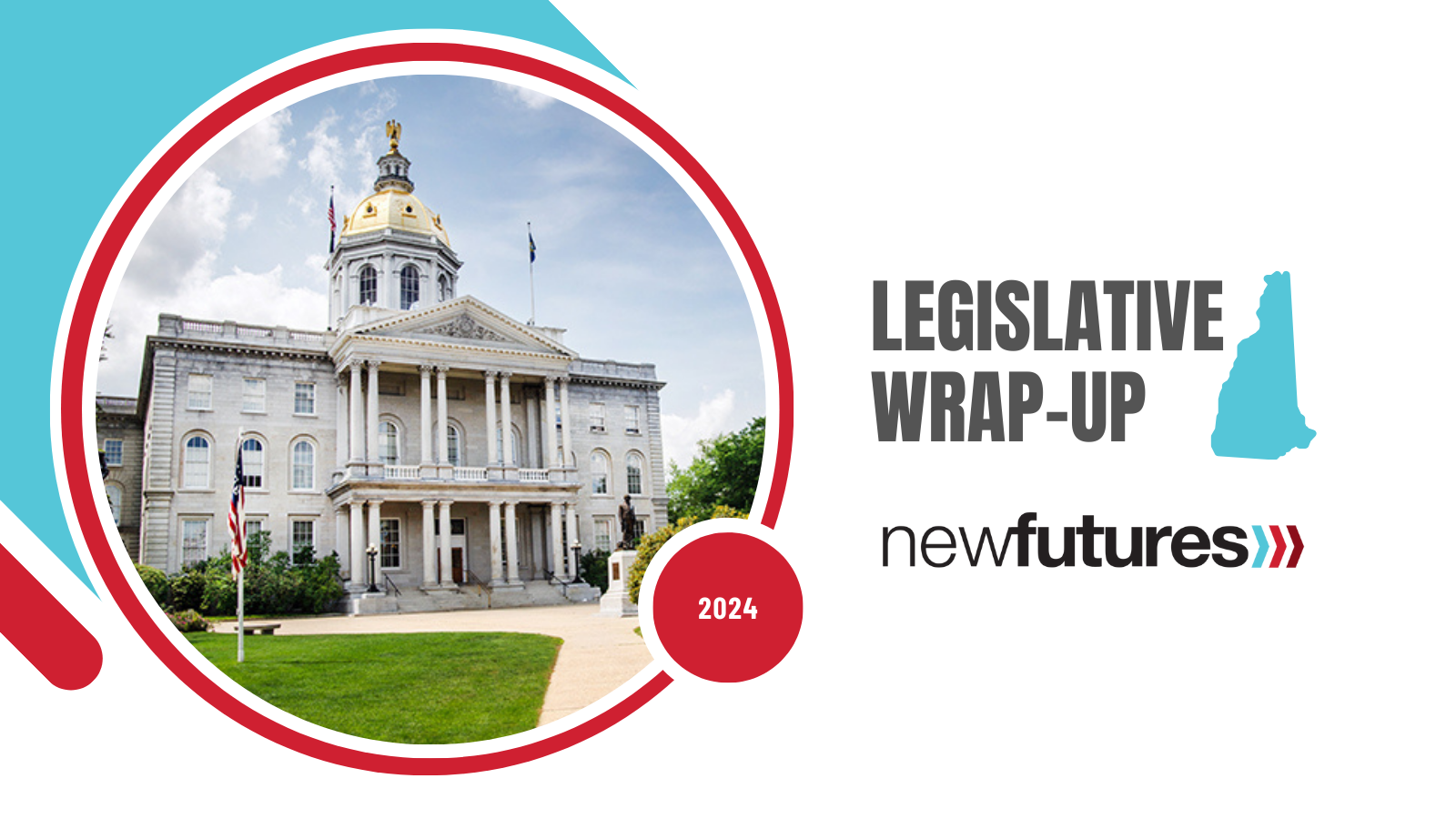
Each year from January to June, the New Futures staff works diligently to advance policies that improve the health and well-being of people across New Hampshire. Our policy team provides lawmakers with evidence-based data, our community engagement team inspires Granite Staters to get involved in the legislative process, and our communications team spreads the word about important issues.
The 2024 Legislative Session wrapped up on June 13. In total, New Futures worked on more than 200 pieces of legislation throughout the year, including 11 priority bills, noted below, that are headed to the Governor’s desk and still require action.
Scroll down to read through each bill, or jump to an issue area that you care about:
Early Childhood | Children's Behavioral Health | Access to Health Care | Healthy Aging | Public Health | Substance Use Disorder | Alcohol & Other Drugs
Early Childhood Policy
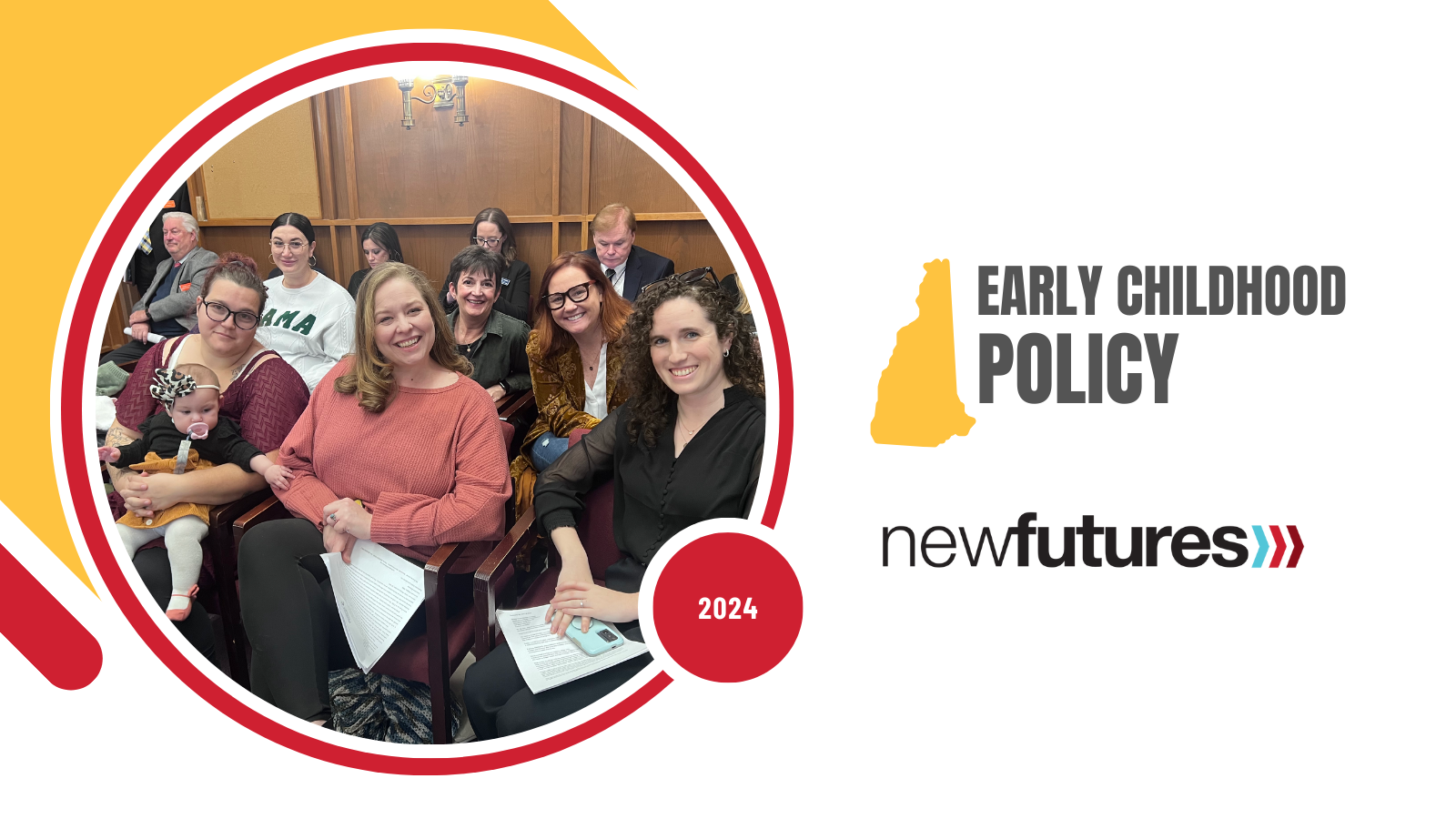
Child Care for Child Care Workers
Status: Signed into Law by Governor
New Futures and other members of the New Hampshire Child Care Coalition worked to support SB 404, which provides child care workers with access to the New Hampshire Child Care Scholarship program as a proactive approach to addressing the statewide child care workforce shortage. This bill, which was heavily stripped down in the Senate, was revived by the House of Representatives’ Special Committee of Childcare to ensure the program was implemented. The Senate concurred with the House-amended version of SB 404, and the bill advanced to the Governor’s desk. Signed into law on August 2, more child care workers in the Granite State will receive automatic access to the New Hampshire Child Care Scholarship program beginning in January 2025.
Resources for Child Care Centers
Status: Signed into Law by Governor
The Child Care Coalition also supported SB 596, which will provide additional funding to child care centers caring for children with extra behavioral or developmental needs through the New Hampshire Child Care Scholarship program. The bill faced challenges in both the Senate and the House, and was ultimately tabled in the House by just one vote. However, recognizing the critical need for this legislation, the Senate amended HB 1202 to include the original language of SB 596. HB 1202 passed the Committee of Conference and the House and Senate chambers, and advanced to the Governor’s desk. Governor Sununu signed HB 1202 into law on August 23, which will help child care centers meet the needs of all children and safely maximize enrollment in their facilities, further addressing the state’s child care availability crisis.
Child Care Immunization Requirements
Status: Defeated in Senate
HB 1213 would have weakened public health protections for young children by undermining child care reporting and exempting child care centers from any immunization enrollment requirements. This would have unnecessarily risked critical federal funding for child care centers. Thankfully, after initially passing the House, the bill was sent to Interim Study in the Senate ensuring it did not advance this session.
Children's Behavioral Health
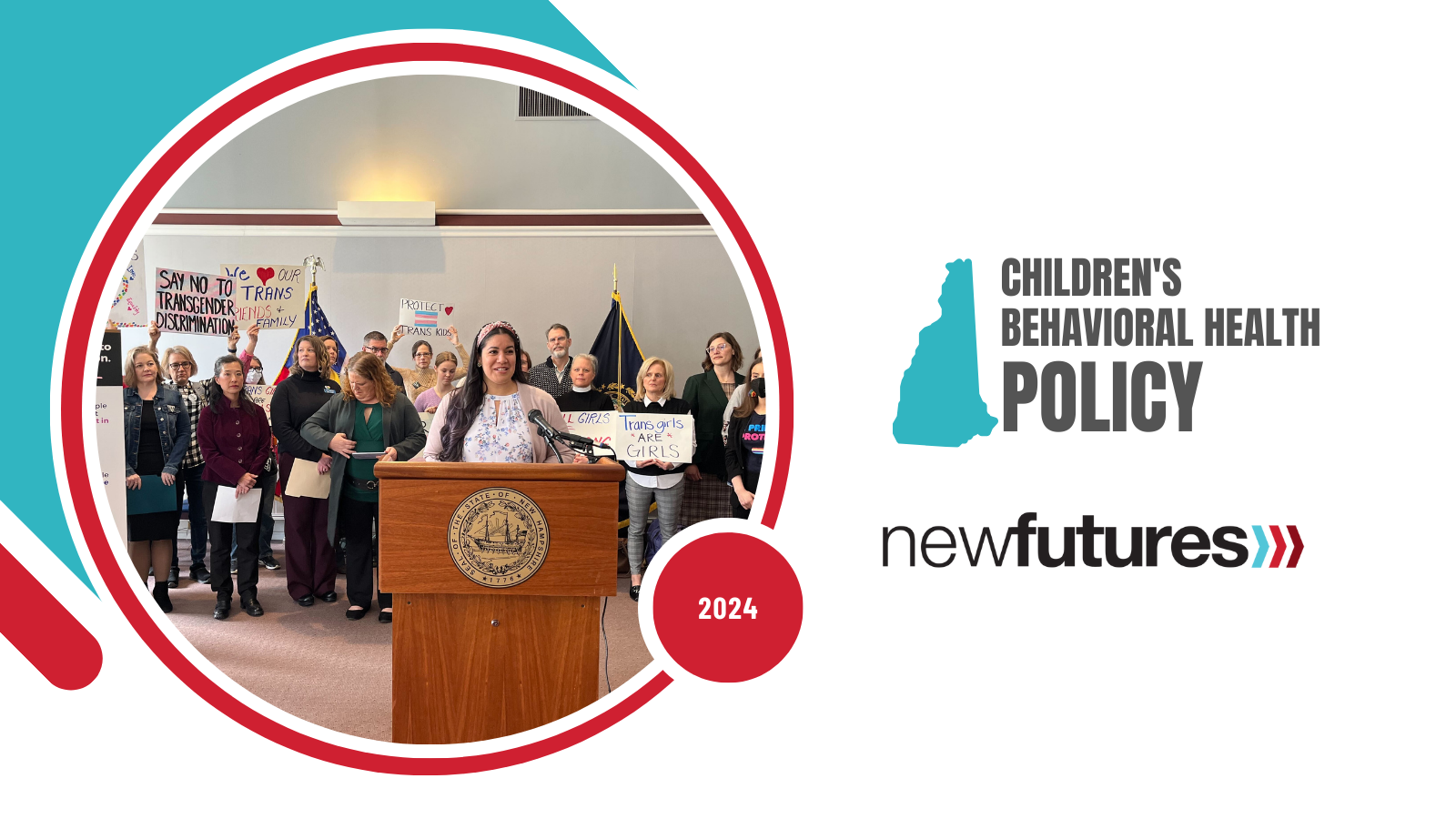
Insurance Coverage for Youth Mental Health Services
Status: Signed into Law by Governor
There are many gaps in insurance coverage for youth accessing mental health services in New Hampshire. Once signed into law, SB 411 will establish a committee to assess and address insurance coverage gaps and parity compliance for mental health services for youth in New Hampshire. These services include wraparound services, behavioral or mental health crisis assessments, crisis intervention services, crisis stabilization services, intensive in-home services, residential treatment services, intensive structured outpatient programs, parent and youth peer support services, and partial hospitalization programs, among other services critical to meeting the needs of New Hampshire's most vulnerable children. SB 411 passed both the Senate and the House with strong bipartisan support and was signed into law by Governor Sununu on July 3.
Attempt to Ban Social-Emotional Learning in Schools
Status: Defeated in House
Social-emotional learning (SEL) is the process of developing the self-awareness, self-control, and interpersonal skills that are vital for school, work, and life success. A House Bill introduced this session, HB 1473, attempted to ban SEL in public schools, prohibiting educators from teaching students these important life skills. At the House Education public hearing in January, over 40 teachers, administrators, and parents testified in opposition to the bill, and 4,290 people provided online testimony submissions to oppose the bill. New Futures’ youngest advocate, Cordelia, showed legislators techniques like five-finger breathing skills to help her manage her feelings. Her testimony helped lead Representatives to defeat the bill in the House and earned her local news coverage on WMUR and a trip to Washington, DC to meet with elected officials on Capitol Hill during National SEL Week.
Anti-LGBTQ+ Legislation
This session, a series of over 30 bills targeted LGBTQ+ youth and families in New Hampshire. New Futures worked throughout the session with coalition partners to protect the health and rights of LGBTQ+ youth. Most of the bills were defeated throughout the session, but four remaining bills went to Governor Sununu’s desk, and he signed three of them into law. Learn more about the bills below.
Discrimination in Public Spaces
Two bills, HB 396 and SB 562, proposed to discriminate against transgender people by banning them from using restrooms or locker rooms and participating in sports that align with their preferred gender identity. Bans such as these prohibit transgender youth from participating in typical daily activities and make them feel unwelcome in their communities, which leads to poorer mental health outcomes.
- Status of HB 396: Vetoed by Governor
After HB 396 passed the House, a state Representative urged the House to reconsider the harmful bill. The vote of reconsideration failed narrowly by just seven votes. The Senate then passed the bill, sending it to the Governor’s desk.
- Status of SB 562: Defeated in Senate
The Senate voted to table SB 562, so it did not advance this session. However, HB 396, the similar bill above, is still advancing.
Censorship in Schools
When LGBTQ+ youth feel support, acceptance, and open representation within their homes, schools and communities, they have much better mental health, educational and social outcomes. Four bills – HB 1312, SB 341, HB 1356, and HB 1419 – would violate a basic trust that all students, including LGBTQ+ students, can learn and thrive in a safe environment. Three have been defeated, while one is moving to the Governor’s desk.
- Status of HB 1312: Signed into Law by Governor
HB 1312 attempts to silence discussions of gender and sexuality in the classroom by implementing a two-week advance notice of any curriculum including those topics. This bill passed the House by just one vote in March, and later passed the Senate, sending it on to the Governor.
- Status of SB 341: Defeated in House
SB 341 would have required teachers to "out" students to their parents when requested. If teachers are required to share sensitive information with parents before the student is ready, the student misses out on the opportunity to feel supported by a trusted adult. This bill passed the Senate but was defeated in the House.
- Status of HB 1356: Defeated in House
HB 1356 would have banned public school employees from using students’ preferred names and pronouns without written permission from the student’s parents or guardians. This bill was defeated in the House.
- Status of HB 1419: Defeated in House
HB 1419 would have limited a school’s ability to have materials regarding gender identity or sexual orientation. The House voted to Indefinitely Postpone the bill, so it did not move forward this session.
Bans on Sports Participation
This session, three bills – HB 1205, SB 375, and SB 524 – aimed to ban transgender girls from playing on sports teams that align with their gender identity at either the interscholastic level, the collegiate level, or both. Athletics are an important part of childhood, offering opportunities to build a sense of belonging and learn important life skills like teamwork, leadership, confidence, and self-discipline. The overwhelming majority of transgender kids, like most children, don’t play at elite levels; they just want to participate with their peers.
- Status of HB 1205: Signed into Law by Governor
HB 1205 bans transgender girls from playing on girls sports teams at public middle and high schools. It is unclear how this bill would be enforced, which could lead to intrusive and damaging inquisitions on any student-athlete. The bill passed both the House and Senate, and is now headed to the Governor’s desk.
- Status of SB 375: Defeated in House
SB 375 would’ve extended the ban to collegiate athletics and girls' locker rooms, and allowed legal recourse for those harmed by people who violate the law. This bill passed the Senate, but was defeated in the House in early May.
- Status of SB 524: Defeated in Senate
SB 524 would have banned girls from participating in sports at the interscholastic and intercollegiate levels. The Senate referred the bill to Interim Study in early April, so it did not move forward this session.
Bans on Medical Care
Transgender teens, like all teens, have the best chance to thrive when they are supported and have access to the doctor-prescribed medical care they need when they need it. Three bills this session put medical decisions into the hands of politicians, rather than doctors, parents, and patients. These medical decisions involve gender-affirming care, which is evidence-based and supported by medical authorities like the American Academy of Pediatrics and the American Medical Association.
- Status of HB 619: Signed into Law by Governor
HB 619 bans gender-affirming surgery for transgender teens and prohibits doctors from referring their care to out-of-state doctors. This bill was introduced in 2023 and was retained, so it returned this year for further review. It passed both the House and the Senate and is now headed to the Governor’s desk.
- Status of HB 1011: Defeated in House
HB 1011 would have criminalized gender-affirming care for transgender teens. This bill was defeated in the House.
- Status of HB 1660: Defeated in Senate
HB 1660 would have banned Medicaid insurance plans from covering gender-affirming surgery for transgender teens. Although it passed the House, it was tabled in the Senate and did not move forward.
Access to Health Care
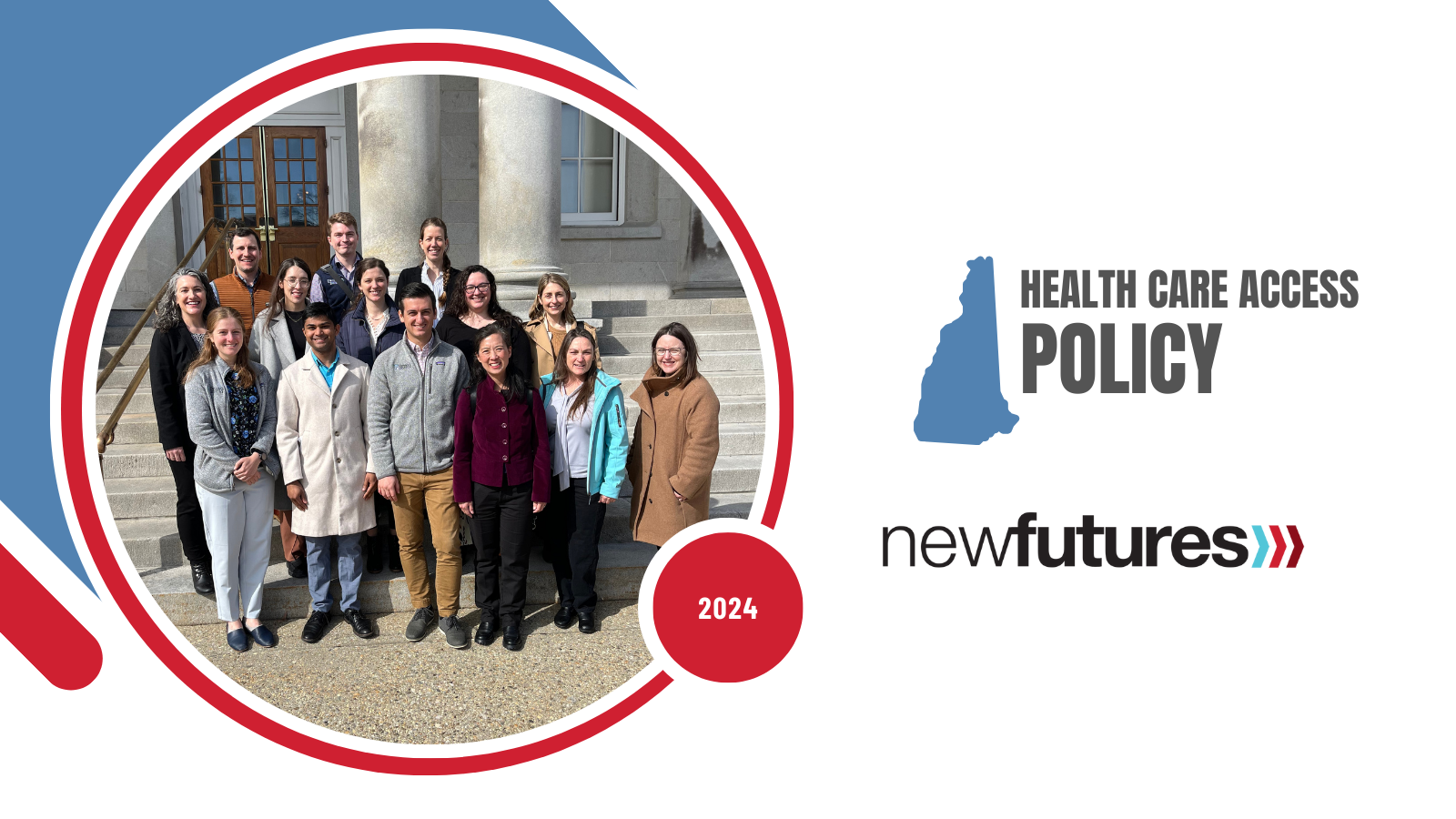
Growing New Hampshire’s Health Care Workforce
Status: Signed into Law by Governor
New Futures worked with members of the New Hampshire Health Care Workforce Coalition to support SB 403, which aims to increase access to care for Granite Staters by growing the health care workforce. Although the Senate passed an early amendment that removed funding for many of the programs, a critical provision supporting Community Health Workers (CHWs) remained in the bill. The House then passed an amended version of the bill, and the Senate voted to concur with their amendment, sending it to the Governor’s desk. The Governor signed SB 403 into law on July 26, creating voluntary certification for CHWs, which provides a clear career path and greater financial stability for these frontline health workers.
Healthy Aging
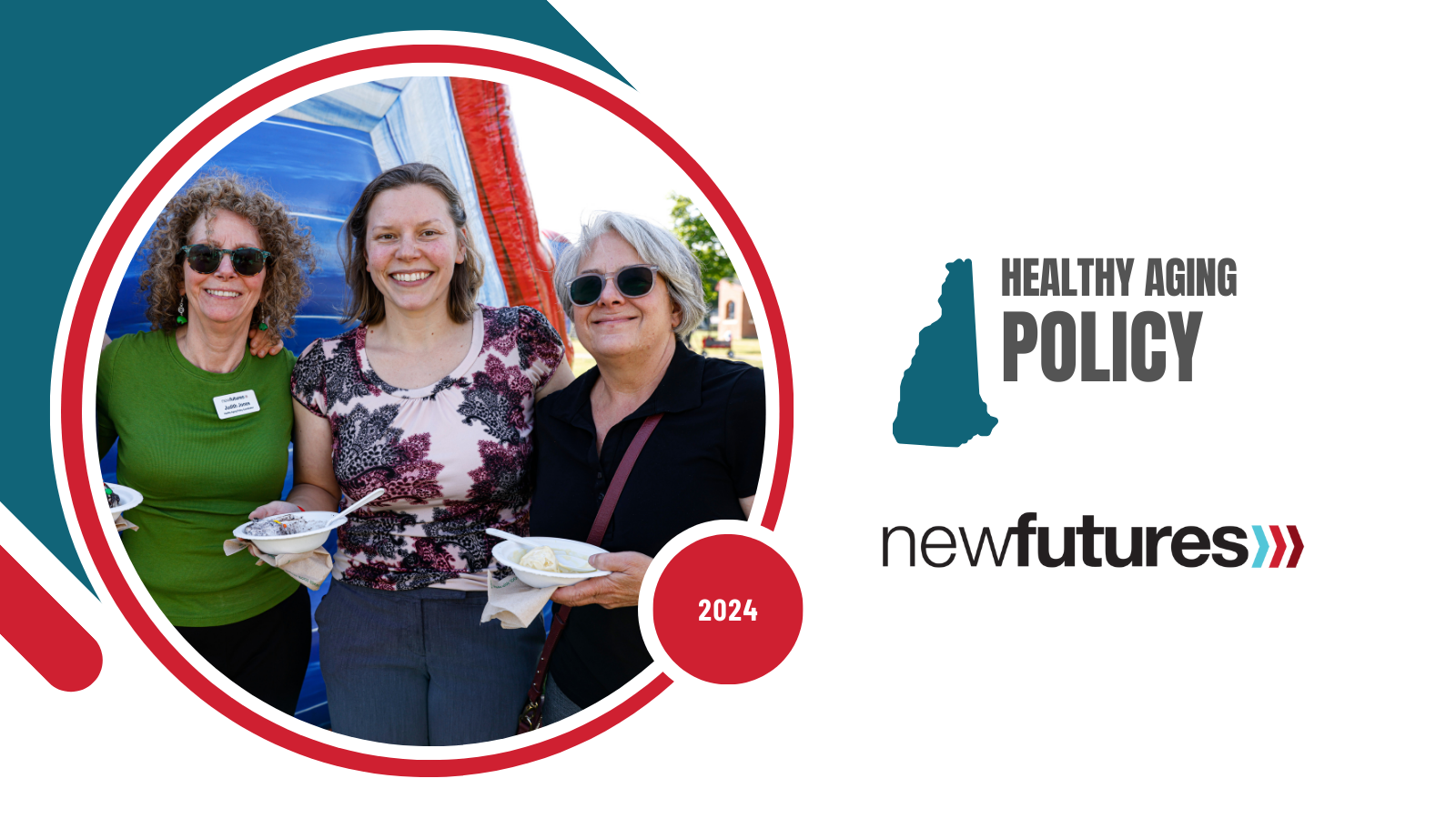
Ending Hunger for Older Adults
Status: Signed into Law by Governor
New Hampshire currently sees low participation of older adults in the Supplemental Nutrition Assistance Program (SNAP), a program to help low-income individuals access food and better nutrition. Many low-income older adults eligible for SNAP benefits are not accessing the program because of the complex application process. To help address this problem, SB 499 would make it easier for adults 60 years or older and people with disabilities to enroll and stay enrolled in SNAP through the use of the federal Elderly Simplified Application Project (ESAP). New Futures worked in partnership with NH Hunger Solutions to support this bill, which also provides funding for Summer EBT, a federal program that feeds kids during the summer. The bill was amended multiple times in both the Senate and the House, but ultimately passed a Committee of Conference and both chambers in a final vote. Governor Sununu signed SB 499 into law on August 2.
Public Health
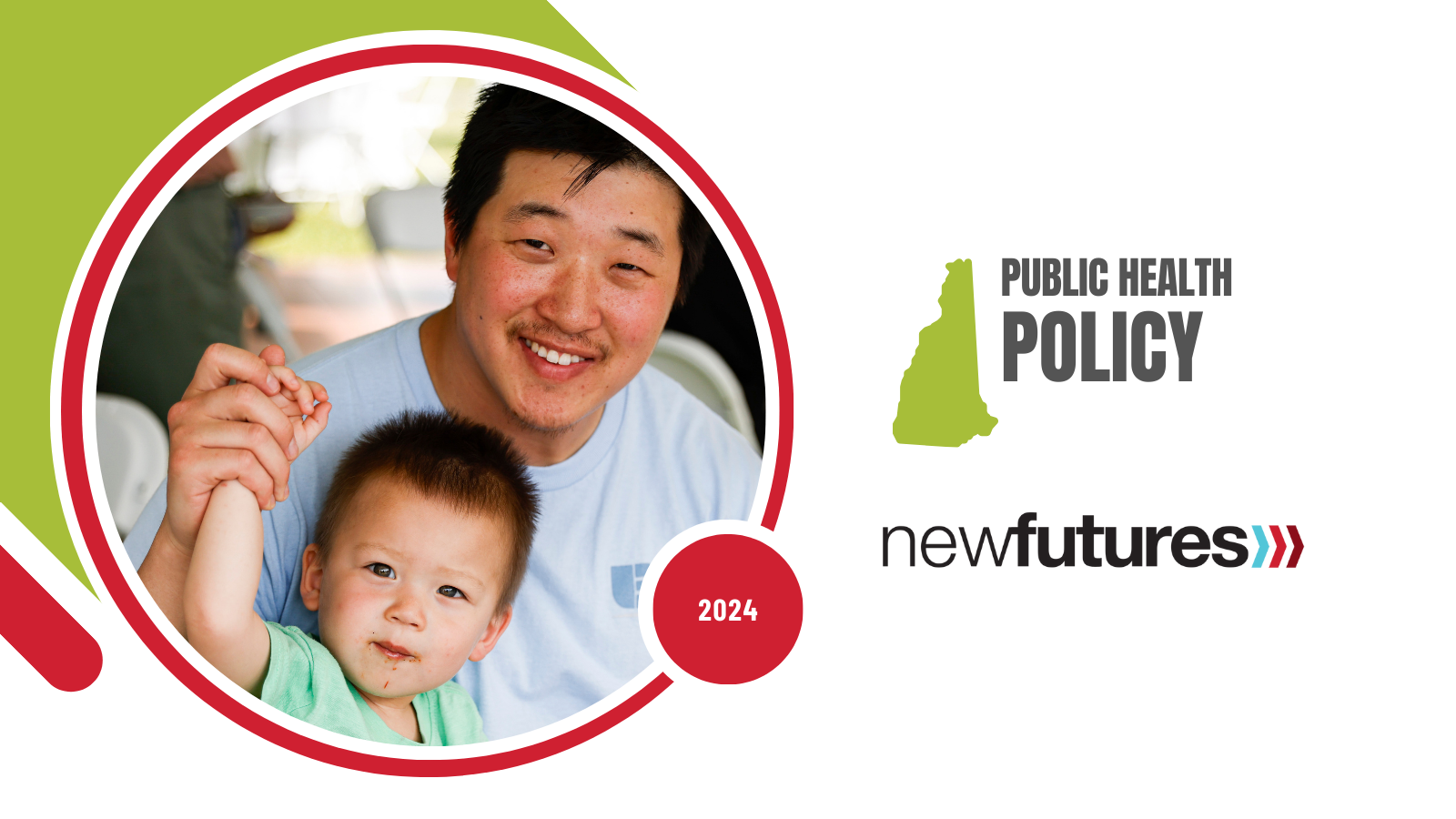
Preventing Childhood Lead Exposure - Increasing Access to Lead Testing
Status: Signed into Law by Governor
Lead exposure continues to affect the health of children and families in New Hampshire. Recent years have shown that young children in our state are still experiencing lead poisoning and that lead testing is declining. SB 399 helps families access lead testing by removing financial barriers. It requires insurance companies to cover the full cost of lead testing at one- and two-years-old, and any follow-up testing needed due to elevated blood lead levels. This bill, which will make lead testing free for New Hampshire’s most at-risk children, was signed into law on July 3. The law change will go into effect on September 1, 2024.
Making NH Homes Lead-Safe
Status: Defeated in House
SB 392 aimed to increase efforts to make New Hampshire homes and communities lead-safe. It proposed to allocate additional resources to a lead removal fund that helps homeowners and owners of residential properties remove lead hazards from their buildings. Although the Senate voted to table this bill, New Futures and our partners are continuing to pursue funding opportunities for this critical program.
Ensuring Access to RSV Immunization for NH Children
Status: Signed into Law by Governor
RSV immunization protects babies from severe Respiratory Syncytial Virus, a common condition that is the leading cause of infant hospitalization in the U.S. Unfortunately, the new RSV immunization is not covered by the existing New Hampshire Vaccine Association law, which provides vaccines to all New Hampshire children regardless of their ability to pay. SB 559 addresses this gap by ensuring that it is accessible to all New Hampshire children. It doesn’t make the immunization mandatory; it simply removes financial barriers for families who choose to get it. The bill passed both the Senate and the House, and was signed into law by the Governor on July 26.
Substance Use Disorder
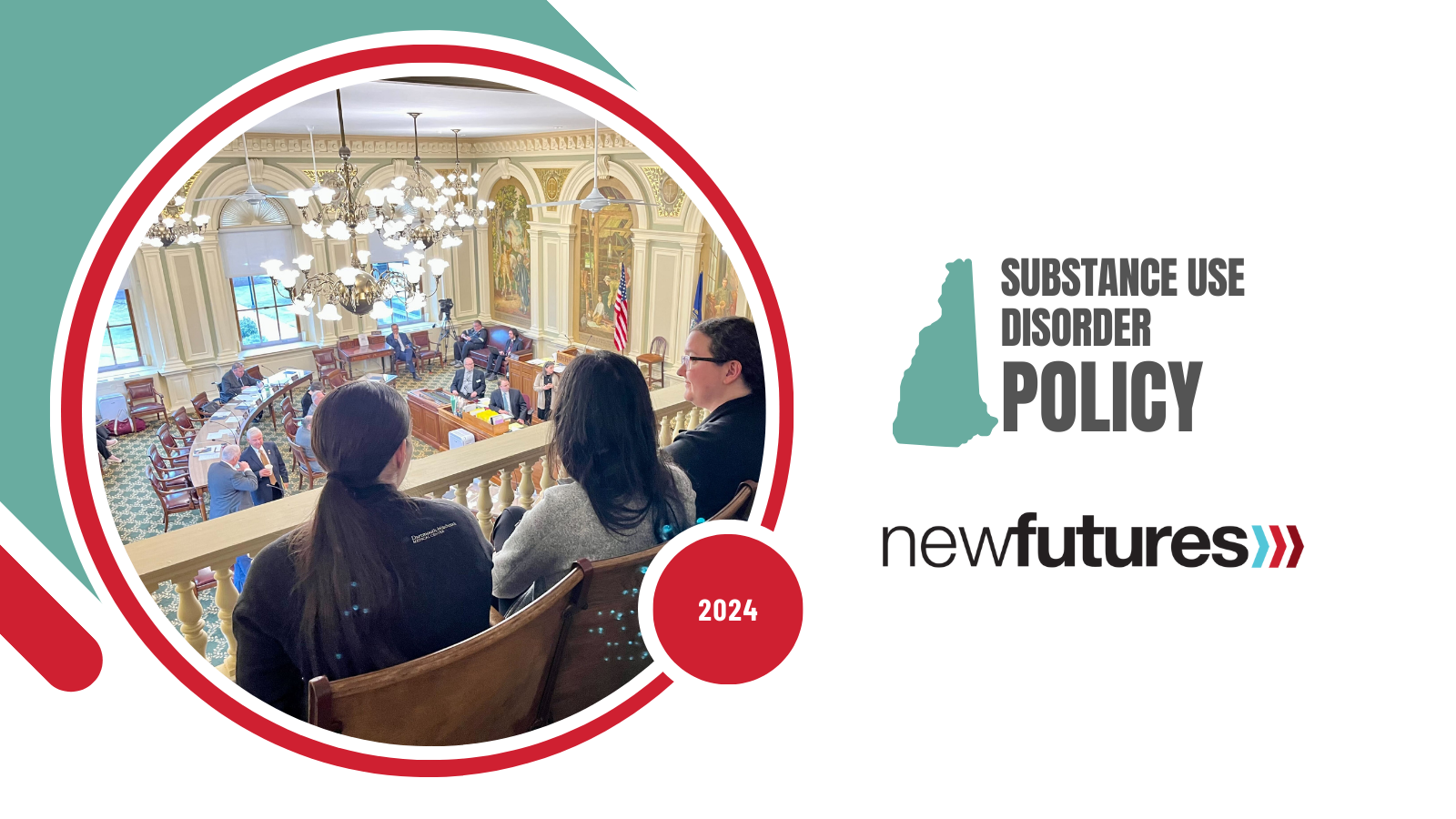
Treatment Services in New Hampshire’s Criminal Justice System
Status: Signed into Law by Governor
Recent data shows that the majority of individuals cycling through New Hampshire's criminal justice system experience Substance Use Disorder, mental illness, or both. SB 508 takes steps to address this recidivism by increasing access to substance use and mental health screening and treatment for incarcerated individuals. After passing the Senate, the House added an unrelated amendment to the bill, but the Senate voted to concur with the House’s amendment so the bill advanced to the Governor’s desk. Governor Sununu signed SB 508 into law on August 2.
Oversight of Substance Use Treatment System
Status: Defeated in Committee of Conference
SB 495 aimed to improve New Hampshire’s substance use treatment system by strengthening patient protections and ensuring high-quality services throughout the state. Although SB 495 passed the Senate, the House of Representatives voted to refer the bill to Interim Study. Since SB 495 was not moving forward, New Futures attempted to incorporate language from the bill into another bill. However, a Committee of Conference did not include the SB 495 provisions in the final version of the bill, meaning this effort will not move forward this session. Despite the setback, New Futures is continuing to work to ensure quality services and patient protections across the treatment system.
Supporting the Development of Recovery Housing
Status: Defeated in Committee of Conference
In New Hampshire, access to housing remains one of the greatest obstacles for people facing addiction. Recovery housing is important for individuals with substance use disorder because it provides a safe and healthy living environment. HB 1521 aimed to expand access to recovery housing in New Hampshire by helping cities and towns develop recovery housing resources. Although the bill passed the House, the Senate passed an amended version of the bill that would have made it more difficult to develop recovery houses in some communities. The bill then went to a Committee of Conference, which could not come to an agreement on this bill, meaning it did not advance this session. New Futures will continue to work with partners to support the development of recovery housing around the state.
Alcohol and Other Drugs
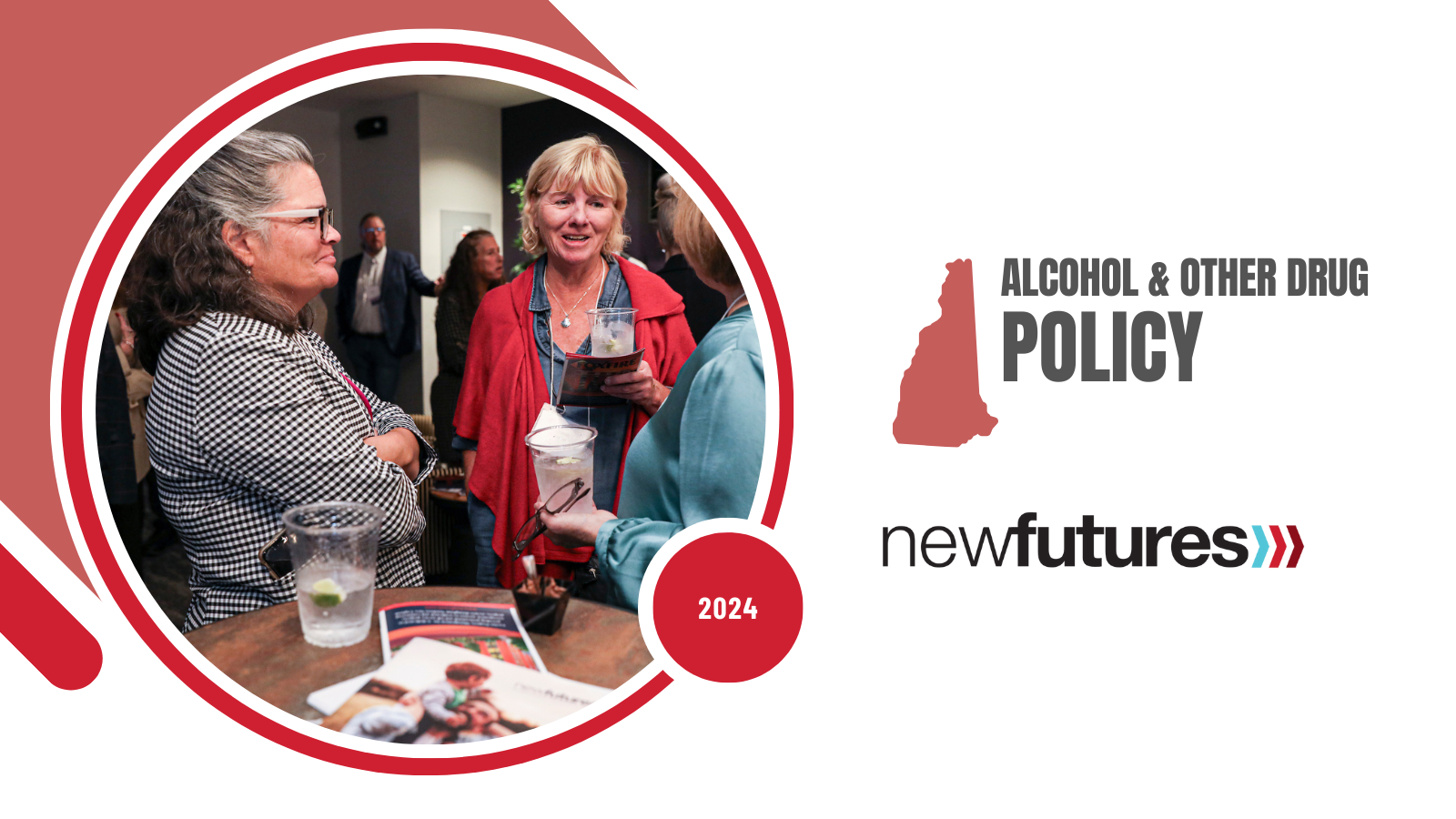
Cannabis Commercialization
Status: Defeated in House after Committee of Conference
HB 1633 was the only bill in the legislature this year attempting to legalize cannabis for adult use. Optimal cannabis commercialization policy for our state must utilize the best available scientific evidence to reduce public harm, limit youth and problematic use, and purposefully advance social justice and equity in the state. HB 1633 was amended numerous times in both the House and the Senate, meeting some of New Futures’ Principles for Responsible Cannabis Policy and Regulation. In May, the Senate passed HB 1633, marking the first time in state history that the New Hampshire Senate has voted to advance cannabis legislation. After the House voted not to endorse the Senate amendment, the bill went to a Committee of Conference, which reached a compromise on the bill. However, in the final vote,the House elected to table the bill, which stalled it for the session. New Futures will continue to ensure our Principles are valued in future legalization and commercialization discussions.
Banning Hemp-Derived THC Products
Status: Signed into Law by Governor
Due to a legal loophole, hemp-derived THC products known as delta-8, delta-9, and delta-10 were sold in New Hampshire until October 2023. During the 2023 legislative session, New Futures helped to pass a bill that prohibited the sale of these dangerous and unregulated products for one year. This year, SB 505 was introduced to extend the ban permanently. The Senate passed the bill unanimously but the House attempted to add a non-germane amendment to the bill, which was ultimately defeated in favor of the original version of the bill. Governor Sununu signed this bill into law on July 3, and it immediately went into effect.
Attempt to Repeal Alcohol Fund
Status: Defeated in House
Financed through the revenues generated through liquor sales in New Hampshire, the Alcohol Abuse, Prevention & Treatment Fund (“Alcohol Fund”) is an innovative, fiscally responsible, common sense approach to addressing substance misuse. It directs 5% of gross profits of alcohol sales to substance use disorder prevention, treatment, and recovery. A bill introduced this year, HB 1702, would have repealed the Liquor Commission Fund and required all revenue generated by the New Hampshire Liquor Commission to be deposited into the state's general fund. In addition, this bill would have disrupted the funding structure of Medicaid expansion, potentially putting the program's funding, and the health care of thousands of Granite Staters, at risk. At the end of March, the House voted to send the bill to Interim Study, defeating the bill for this session, and successfully protecting the Alcohol Fund.
Limiting Alcohol Advertising to Youth
Status: Defeated in Senate
In the last few years, new alcoholic beverages have emerged on the market that share branding with popular children's products or include labeling featuring cartoons or children's characters. These products are unreasonably attractive to youth, so a 2024 bill, SB 335, aimed to add responsible labeling restrictions to current alcohol advertising laws. Despite compelling testimony from Dover Youth2Youth and other young people, the Senate tabled the bill in late March.
Legalizing Drug Testing Kits
Status: Defeated in Senate
It is more important than ever for New Hampshire to adopt evidence-based harm reduction strategies to prevent overdoses and save lives. Under current law, with the exceptions of fentanyl and xylazine test strips, possession with intent to distribute lifesaving drug-checking equipment is an unclassified misdemeanor and punishable by up to one year in jail and a fine of $2,000. HB 470, a bill retained from the prior session, would have made it easier for Granite Staters to access life-saving drug testing kits to prevent overdoses. Although the House passed the bill in January, the Senate unfortunately did not, and the bill failed to advance.

